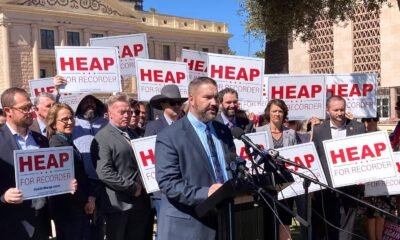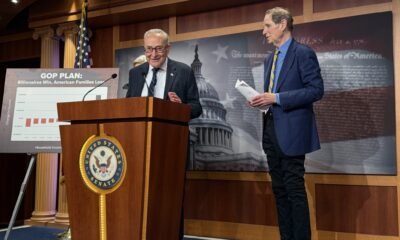abortion
Reproductive Rights Showdown: Trump vs. Harris Unveiled

WASHINGTON — This year’s election marks a significant moment for U.S. voters, who are navigating the political landscape in the wake of the Supreme Court’s decision to overturn Roe v. Wade. The ruling has escalated reproductive rights to the forefront of the electoral debate.
Democratic nominee Kamala Harris and Republican candidate Donald Trump have engaged in extensive discussions regarding abortion access. Trump, whose position has shifted, now asserts he would not endorse nationwide abortion restrictions, advocating instead for state-level regulation.
In contrast, Harris has remained steadfast in her belief that a federal law ensuring access to abortion would empower women to make their own choices, free from political interference. “I pledge to you, when Congress passes a bill to restore the protections of Roe v. Wade, as president, I will proudly sign it into law,” she declared during a recent presidential debate.
During the same debate, Trump highlighted his appointments of three Supreme Court justices who upheld the ruling that rescinded the constitutional right to abortion. He confidently stated, “I did something that nobody thought was possible. The states are now voting.” In response to Harris’s claims that he would favor a nationwide ban, Trump referenced Project 2025, a conservative initiative, yet distanced himself from its more extreme proposals.
Misinterpretations of the Supreme Court’s ruling persist, with many claiming it merely shifted regulatory power to the states. In reality, the ruling clarified that the authority lies with both Congress and the presidency.
Trump’s trajectory on abortion policy has been anything but straightforward. Earlier this year, he advised Republican leaders to sidestep the conversation to ensure electoral success while simultaneously courting anti-abortion organizations. His previous endorsement of a 16-week national ban has since transformed into a reluctance to back any federal law regulating abortion.
Following Trump’s statement in April, pro-life advocates expressed disappointment, arguing that his assertion only strengthens Democrats’ attempts to legislate expansive abortion rights. “Saying the issue is ‘back to the states’ cedes the national debate to the Democrats,” remarked Marjorie Dannenfelser, President of Susan B. Anthony Pro-Life America.
In June, Trump expressed his alignment with an organization that condemns abortion vehemently, indicating a complex stance. However, a recent social media post reiterated his opposition to any federal abortion ban, maintaining that decisions should be left to individual states.
Meanwhile, detailed statistics indicate that the majority of abortions occur within the first trimester, suggesting that late-term procedures are far less common. Factors such as unexpected pregnancies and access barriers contribute significantly to later-term abortions.
Harris has consistently condemned Trump’s celebratory tone regarding the Supreme Court’s decision, emphasizing the restrictive impact of state laws on women. “Trump’s abortion bans that make no exception even for rape and incest is immoral,” she argued, calling for a shift in the legislative filibuster to facilitate the passage of a national abortion protection bill.
As both candidates vie for electoral victory, their positions on abortion access could greatly influence outcomes in key battleground states like Arizona and Georgia. Democrats are banking on ballot initiatives related to abortion rights in multiple states to boost voter turnout.
In Arizona and Florida, referendums may sway public sentiment significantly, potentially igniting increased voter motivation. Experts like Louis Jacobson suggest that the upcoming election will be pivotal, as historical trends indicate that ballot measures related to abortion often succeed in lower-turnout elections.
Public opinion remains polarized; Pew Research shows that a significant majority supports legal abortion in most cases. With vital elections at stake, Harris and Trump’s contrasting views on this contentious issue will likely define their campaigns and influence voter decisions come November.


















